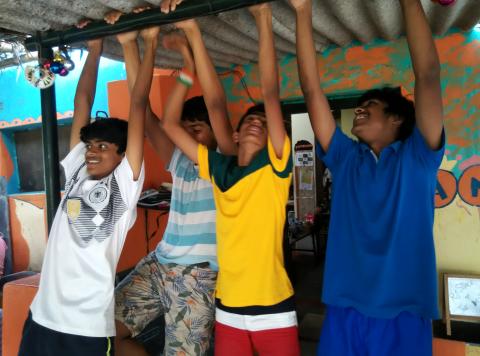
One question often asked “Why a child who is doing campus care at the campus is not doing at home or the child who plans and does self learning at the campus, do not do much during break week at home”.
Some are seeking “how to inculcate certain thoughts / habits / practices / values in children – specially things that children get exposed in Aarohi – but do not continue at home or at any other place like campus care, self care, fitness, even self directed learning or taking initiative and responsibility of oneself”.
As a child we were exposed to many morals “don’t tell lie, honesty is the best policy, kindness is best”…but very few of us can relate with all of these values rather all of us follow our own value.
For me honesty is the value I want to carry
For you kindness is the value you rate high
So the question is “how does one inculcate a value”?
Let’s go back our own process of inculcating…all the of us in one family ( sisters and brothers) got the same exposure (home environment, same inputs from parents) but all the siblings inculcated different values”.
Lets understand
- Often certain thing is done or followed by a child – because it is important in an environment / culture, not necessarily it is important to the child. Which is why, when that child is out of that environment, the practice also stops. For example at the campus “campus care is non negotiable for anybody staying at the campus”. It’s the need and culture of this space. Not necessarily the need or culture of home or even liking of the child.
- Not everything will be inculcated. Even we, adults, would have got some inculcated from our childhood, some not.
- Child has grown till now – used to certain way for many years – say 12 years, now we expect in 1-2 years that to change – well we have to be more patient and more persistent.
- Many a time a habit gets inculcated only at a certain stage of life. So we will need to wait. Better, we can just let go and leave it to the child. Often what is not inculcated is highlighted in our eyes, while what is inculcated is either not notices, or taken for granted or quickly forgotten.
- It could be MY list, while child is working on her or his list. Children and our next generation have a very different view of the world – partly because they are growing up in ‘now’ times while we grew up in ‘old’ time – what their perspective, contexts etc are different hence their response would also be different. We also grew in “now” time but now we are in “old” time!
Remember there is only one universal law – “What works for me!
So this is what we suggest: When children do not show inculcation of what they are exposed to and what we expect – Write it down as a letter / email to the child and send it to him or her and then lets see some years later – say after 20 years – how it goes! You might be surprised.
—– Let’s end this with a story —–
This is famous Buddha story. A man came to Buddha and said, “O enlightened one, you have so much wisdom which you are sharing with so many of us. Daily people throng to listen to you – but few only follow the path to enlightenment. Why is this so?”
Buddha smiled, “I like your concern dear man. Bit before I answer your question, tell me which village you are from?
The man replied with the name.
“Do you know the route to your village well?”
The man replied in affirmative.
“If anybody asks you the route to that village, do you share?”
The man said yes.
But do all the people who ask you the route, go to your village?
“How would I know?” asked the puzzled man.
“And if you see somebody, after asking, is not going, will you carry him to your village.”
“Oh no no no, why would I do that,” exclaimed the man.
Buddha concluded, “In the same way, I share the way, what I know, with whoever seeks. But neither I need to keep track of who is following the path, nor do I want to carry anybody to their enlightenment.